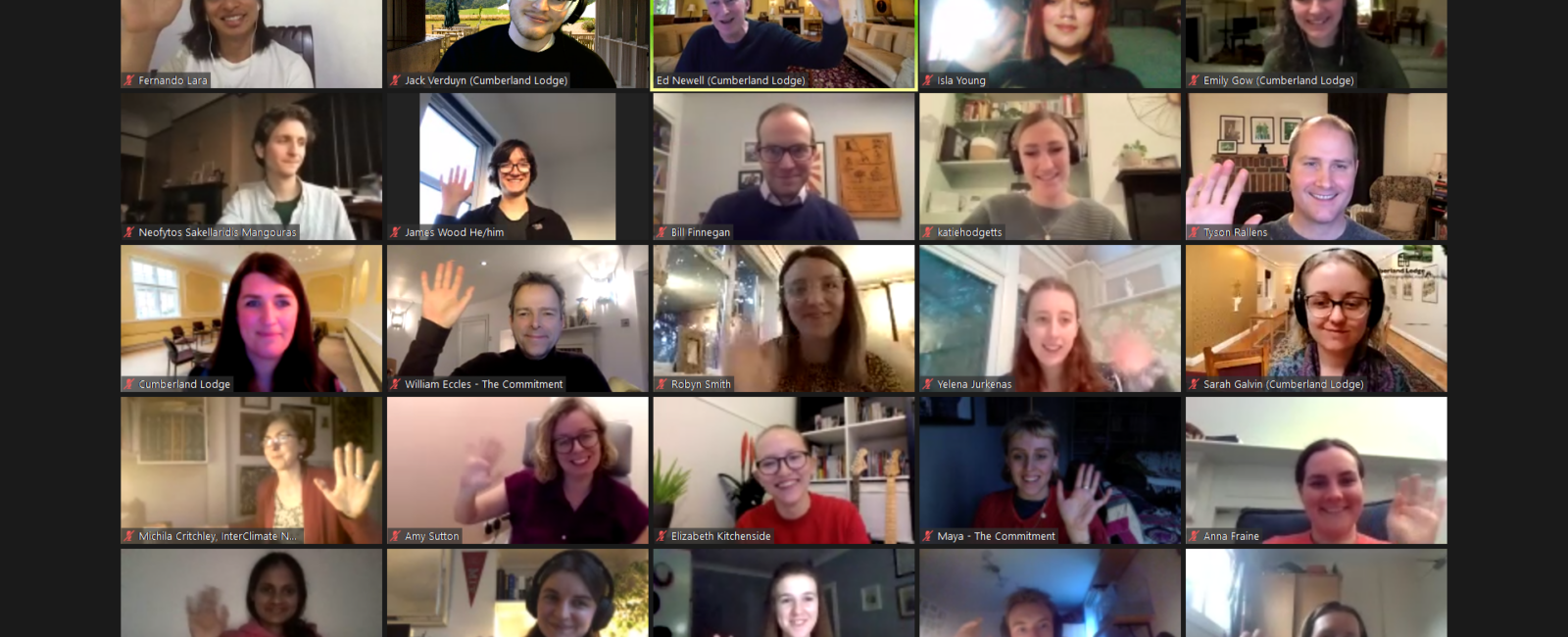The final session of the Cumberland Lodge virtual conference, Climate Futures: Youth Perspectives, took place online on 18 March 2021. It explored the effectiveness of ordinary democratic processes in tackling the climate emergency, and the role of street-level campaigning and activism in driving positive changes in leadership, policymaking and citizen behaviour.
The guest speakers were:
- Camilla Born – Deputy Director of Strategy for COP26, UK Cabinet Office
- Katie Hodgetts – Campaigner, UK Youth Climate Coalition
- William Eccles – Co-Director, The Commitment
- Elibarick Simon – Environmental activist and youth champion, Raleigh International
Expectations vs reality
The first speaker shared their experiences of moving from an assumption that international collaboration would solve the world’s problems, towards a discovery that the reality is completely different when you work on climate policy; when world leaders meet, they have usually already discussed the issues at stake and therefore come with planned agendas and ‘red lines’ of what they are prepared to accept.
This speaker emphasised that all the parties who participate in UN climate change talks – including senior representatives from civil society, activists, and institutions – are chiefly interested in the global economy, and they all have different trade-offs.
I came away with three key take-aways from this presentation. Firstly, that ‘making friends’ with officials rather than politicians is the most effective way to drive change, because climate officials are the ones who are most likely to help implement what you want to achieve.
’You can shout at politicians, as you elected them to do what you want, but officials are the ones who work for politicians.’
The second piece of advice was to act early when participating in policy. Since there are certain agendas and red lines involved, activists should be prepared well in advance of global meetings and be proactive about exerting influence.
The final piece of advice was to challenge yourself when it comes to climate activism; to write goals and push yourself to do them.
What can COP26 in Glasgow achieve?
One panellist shared their hopes for what COP26 in Glasgow might achieve, explaining that the overriding purpose of the UN Framework Convention on Climate Change (UNFCCC), which was set up 30 years ago, is to negotiate a global approach to tackling climate change. Drastic changes to this deal have already been made, because initially commitments to adaptation were limited in scope and focused on particular parts of the world. Now there is a recognition that greater changes are required, globally, in order to get closer to net-zero greenhouse gas emissions, which was the long-term target set at COP21 in Paris. COP26 should build momentum and confidence around this, and it should be preceded and followed up by real actions that go beyond policy statements and national commitments.
Spoken words vs commitment
One of the speakers explained how governments around the world are not taking enough action regarding climate change, and consequently this affects what individuals and business do. Governments promise a lot of action, but they do not always put this into practice.
’Their actions don’t meet their words.’
A lot of research into people’s lifestyle choices with regard to climate change has found that citizens are willing to take action on the back of firm leadership and direction from government. For example, the Britain Talks Climate toolkit reveals that 12% of the voting population vote on the basis of climate. The same speaker mentioned that, ‘Voters increasingly understand and are often ahead of politicians in realising that if we don’t have a healthy planet, we can’t have a flourishing society’.
Make ‘The Commitment’
During this conference session we also discussed a campaign called The Commitment, which aims to put climate change and biodiversity loss at the top of the political agenda in the UK. The Commitment involves citizen signatories promising to vote for politicians who prioritise these two issues in their policymaking. There are many ways in which people can make the Commitment and make their participation known to politicians, such as by writing personal messages or recording video statements. The main purpose of this campaign is to serve as a bridge between citizens and politicians, in order to encourage policymakers to do more to address climate change.
One participant asked the panel how individuals can help to fight climate change and climate anxiety, and the response was that we can all make a difference if we start from ourselves and our homes; even small steps like changing our energy suppliers can be effective.
Another powerful action we can take is to get involved in our communities and local constituencies, whether that is within our families, places of worship, schools or local councils. In turn, this will influence other individuals in those institutions. For instance, a teacher might tell their friend, who is a doctor, about what they have done to save the planet; the doctor might then follow their example and tell another friend, an engineer. The engineer might be inspired, in turn, to take further action at work that makes a significant climate impact on a wider scale, and so on.
‘I think starting work from where you are influencing not only the things that are very much just within your grasp, but that chain of command of other people who are within that community that could change things more than you can.’
Campaigning strategies and effective activism
One speaker advised us to look at some other successful campaigning examples for ideas on effective climate activism, such as the LGBT+ movement, the Stonewall riots in the 1960s, and the civil rights movement in the US. Such movements have paved the way for effective activism in the UK and globally.
This speaker went on to talk about their own experience in activism. As a teenager they grew angry, having learnt about the wealth and power being amassed by the fossil fuel industry at the expense of the planet’s future, and they started to transform that anger into action. For example, they joined a national campaigning organisation and helped to produce videos and blogs explaining the technical aspects and terminology used around certain methods of non-renewable fuel extraction, in order to help make the information more accessible for young people.
This speaker shared three key learning points with us, from their experience:
- Activism can be done in many ways; not only through demonstrations, but also through writing blogs, creating videos and signing petitions
- Everyone can get involved, and there is no need to be an expert in climate science or a politician to act
- Activism driven by anger may lead to burnout and exhaustion; a focus on resilience is important.
Ideas from the breakout session
In the second part of the conference session, speakers and participants went into virtual breakout rooms together, to carry a small-group exercise. Each group was asked to come up with three demands to present to world leaders at COP26. The following are some of the main ideas and demands that emerged from individual groups and participants:
- Accountability is essential for all the things humans need to do
- Young people should be involved in decision-making at all levels
- Young people should be well-educated around climate issues
- There should be some legislation to ensure that governments put climate issues and a healthy planet at the forefront of their policies
- Climate change cannot be solved without the abolition of capitalism, because a tiny percentage of powerful companies are responsible for around 90% of global emissions
- There should be a union of citizens to help drive climate change policy. This union should not include politicians, corporations or members of the state; it should be made up of ordinary people and especially young people, because what benefits people can be only done by people.
- Decisions regarding climate change should take into account the unique needs, aspirations and capabilities of developing countries and the working classes.
- Legal sanctions should be implemented against countries that fail to meet their climate commitments
- There should be youth representatives for each organisation participating in COP26, to make sure that young people’s voices are heard and taken into consideration when commitments are formulated
- Politicians should listen to young people and promote their suggestions and demands, as the future of the planet belongs to the younger generations
- Policies should be implemented to reduce fossil fuel reliance by creating more green jobs.
Concluding thoughts
The rich, passionate discussion sparked my anxiety towards a topic which is barely talked about in my country, Syria. The emphasis on the individual, and how each person is held responsible for their actions, made me feel guilty for always giving excuses whenever climate change is mentioned. Yes, you can make a difference, no matter how small the action might seem; for example, by creating or sharing a thought-provoking photo or video, producing a blog, or writing something inspiring on social media. Your action is contagious, and it will inspire others to take further steps. Let us all be more responsible and proactive to protect our planet!


